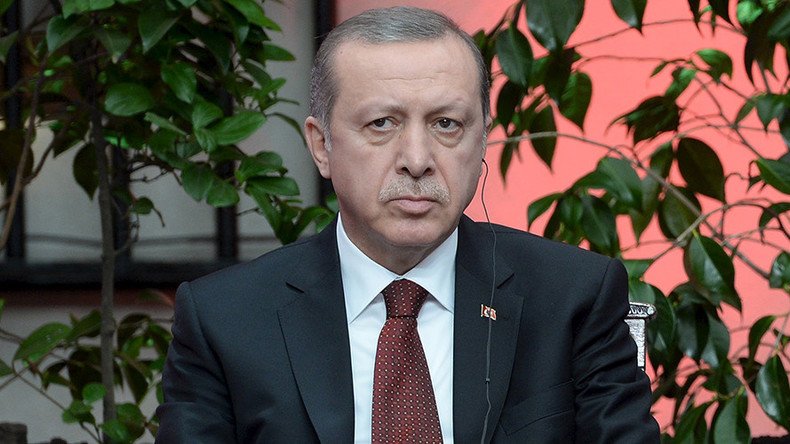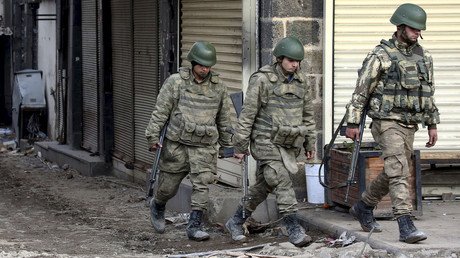‘Dancing in minefield’: Erdogan warns Kurdish militants may hit Europe

Turkish President, Recep Tayyip Erdogan, has lashed out at the EU saying that Europe is “dancing in the minefield” when voicing its support for the Kurds, as it may well see Kurdish terror attacks on its soil.
The angry remarks came after supporters of the Kurdistan Workers Party (PKK), which Ankara views as a terrorist group, were allowed to set up protest tents near the venue, hosting an EU-Turkey summit on immigration on Thursday and Friday.
Europe is “dancing in a minefield” by directly or indirectly supporting terrorist groups, Erdogan said at commemoration of the 101st anniversary of the Battle of Gallipoli in the coastal town of Canakkale.
“There is no reason why the bomb that exploded in Ankara cannot explode in Brussels, in any other European city," he stressed, refereeing to last weeks blast, which took 37 lives and was claimed by a radical Kurdish group.
To make his point clearer, the Turkish president used another metaphor to describe the Kurds, saying “the snakes you are sleeping with can bite you any time.”
Earlier, German Chancellor Angela Merkel expressed concern over the fate of the Kurdish population in the Turkey’s south-east where the government is carrying out a harsh military operation against the PKK fighters.
The EU will continue to “voice our convictions to Turkey regarding, for instance, the protection of press freedom or the treatment of the Kurds,” Merkel said.
Leading UK Labour Party member, Ken Livingstone, urged the Turkish government to allow the Kurds, who are pushing for a state of their own, to decide on their future via a referendum.
“We’ve had basically 100 years of the Kurds being in Turkey and not wanting to be in Turkey. Often it has been fairly peaceful and quite, but they often weren’t represented properly in the Turkish Parliament. It is the legacy of the Ottoman Empire,” Livingstone said.
READ MORE: Lives shattered, homes destroyed: Ankara’s anti-Kurd military op mapped out
The Turkish crackdown on the Kurdish areas began in July 2015, ending a ceasefire agreement between the sides that had held for two years.
The conflict endangered around 200,000 people as a strict Turkish curfew denied people access to water, electricity and medical assistance, with Ankara’s action condemned by leading international human rights groups.
At least 224 civilians (42 children, 31 women, 30 people over the age 60) lost their lives in the south-east during the ‘anti-terrorist’ operation, Turkish Human Rights Foundation said.
The Kurds believe the numbers to be downplayed, with Ertugrul Kurkcu, Honorary President of the Peoples’ Democratic Party (HDP), telling RT that 652 civilians were killed, including 97 children and 94 women.
In February, reports emerged blaming Turkish troops for slaughtering civilians trapped in basements in the Kurdish town of Cizre, with around 150 people allegedly being burnt to death.
After visiting the site of the alleged massacre, RT launched a petition, urging the UN Human Rights council to investigate alleged mass killings of Kurds in Turkey.
RT’s petition on Change.org: We urge UNHRC to investigate alleged mass killing of Kurds in Turkey
During his speech, Erdogan also criticized EU for the way it handles thousands of Middle Eastern refugees, which cross into Europe via Turkey.
“At a time when Turkey is hosting three million [migrants], those who are unable to find space for a handful of refugees, who in the middle of Europe keep these innocents in shameful conditions, must first look at themselves,” he said.
Erdogan's comments come didn’t prevent Turkish Prime Minister, Ahmet Davutoglu, from reaching a ground breaking on limiting migration with the EU.
Late on Friday, several European officials in Brussels confirmed on Friday that the agreement with Ankara “has been approved.”
Davutoglu now has to sing the deal, according to which Ankara would take back all illegal migrants, who cross to Greece, including those from Syria, in return for the EU taking in thousands of Syrian refugees directly from Turkey.
Ankara would also be rewarded with money compensations, early visa-free travel and progress in its EU membership negotiations.
The European Union also agreed to speed up the provision of 3 billion euros ($3.8bn), which it promised to Turkey earlier, and allocate another 3 billion by 2018, Reuters reported.













